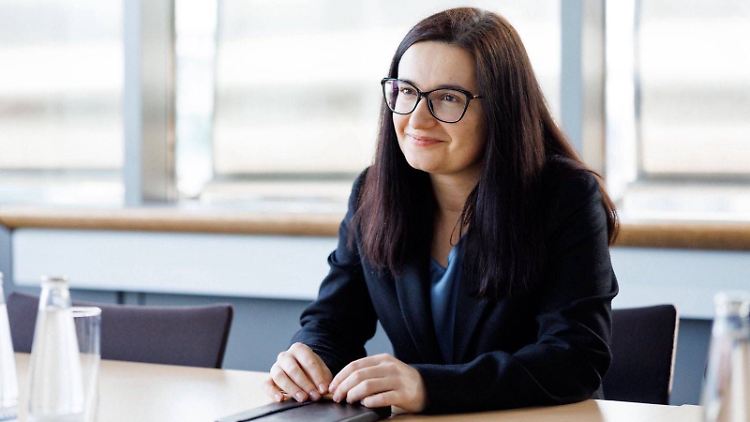Moscow doesn’t just want to destabilize Moldova through hybrid attacks. Moldova’s Deputy Prime Minister for EU Integration, Cristina Gherasimov, explains why the government in Chișinău is still not afraid and why the pro-Russian region of Transnistria would also benefit from joining the EU.
ntv.de: The Republic of Moldova has been a candidate for EU membership since June 2022, and in December 2023 the European Union decided to start accession negotiations. Should Russia feel threatened by Moldova’s EU prospects?
Cristina Gherasimov: It is difficult to imagine how a country with fewer than three million inhabitants can be a threat to a nuclear power with 144 million inhabitants. The EU is a peace project. It was created to put aside the differences between countries and work together for the collective prosperity of its citizens. So how can a peace and prosperity project be threatening to Russia? That’s hard for me to imagine.
The Transnistria region on the border with Ukraine broke away from Moldova in the early 1990s and is administered by a pro-Russian government that is not internationally recognized. To what extent does the conflict with Transnistria hinder your efforts to join the EU?
The Transnistria conflict is not seen in Brussels as a problem for our European integration path. The Transnistrian region is already integrated into the European market. We see that the Transnistria region exports about 70 percent of its goods and services to the European market, and 56 percent of its imports come from EU member states.
So the supporters of the pro-Russian separatists living in Transnistria will not protest against EU accession if it goes ahead?
Everyone wants peace. Nobody wants Moldova to be drawn into a war. Our society demonstrated this unity when we welcomed the Ukrainian refugees. Moldova is moving into the EU. The majority of our citizens support this path. A referendum on the government’s pro-European course is planned for the end of this year to prove this. But Russia is working to hinder this path with various instruments, including disinformation.
The pro-Russian separatists in Transnistria recently asked Moscow for “protection” from Moldova at a special congress. It wasn’t the first request of this kind. What do the separatists want to achieve with it?
Russia is using the Transnistrian region to put pressure on Moldova. But we will not fall into the Russian trap. The Republic of Moldova is taking steps towards the peaceful reintegration of the country. This also means bringing the Transnistrian region into the country’s constitutional, fiscal and financial space. The so-called authorities in the Transnistrian region, on the other hand, want to maintain the status quo. But Moscow was not the only addressee of this document from the pro-Russian separatists in the so-called special congress. It was addressed to several organizations, including the UN, OSCE, EU and Red Cross.
The conflict with Transnistria has also flared up again because Moldova has announced that it will impose tariffs on products that Transnistria exports to the EU. Will Moldova stick with the tax?
There is some dissatisfaction with the new customs code that came into force earlier this year. However, this customs code is fully adapted to EU requirements. What he demands from companies in the Transnistrian region is to pay customs duties like any other company on the territory of Moldova. The Customs Code removes the discriminatory element that existed before. Previously, companies in the Transnistrian region did not have to pay these tariffs, unlike other companies in Moldova. The code was adopted in 2021. So there were three years to prepare for its entry into force.
Around 1,500 Russian soldiers are still stationed in Transnistria. Do you see the presence of Russian troops as a threat to Moldova?
The presence of Russian troops on our territory is illegal. It is a violation of the country’s neutrality enshrined in our Constitution, which prohibits the presence of troops from other states on our territory. We also have the Russian Cobasna ammunition depot, which currently stores around 20,000 tons of ammunition. Most of the ammunition has expired or is stored in miserable conditions. We demand the evacuation of the ammunition. We also demand the withdrawal of Russian troops. We have the support of the international community for our demands.
So you don’t feel threatened by the Russian troops?
The deployment of Russian troops is a disrespect for our independence and sovereignty. We have asked for their withdrawal several times. We hope this happens at the earliest possible opportunity.
You are the chief negotiator for Moldova’s accession to the EU. An important condition for accession is the fight against corruption. What specific measures are you implementing to achieve this?
Previous Moldovan governments have supported existing corruption schemes of the so-called authorities in Transnistria, whether related to energy or smuggling. But this was stopped when the pro-European government took office in 2021. There are a number of measures we are taking. For example, we have increased the capacity of the anti-corruption prosecutor’s office. Members of self-governing bodies from judges and from prosecutors to Supreme Court judges must now undergo an independent vetting process. We also have a de-oligarchization action plan and we have passed a law restricting cash payments to prevent dirty money from being used for undue political and economic influence. We are also committed to preventing corruption. The digitalization of public services helps our citizens and companies interact more efficiently with the state and also reduces the risk of corruption.
After a country becomes a candidate for EU membership, decades can pass before it can become a member. Is that frustrating sometimes?
The last time a country joined the EU was Croatia in 2013. Circumstances have changed dramatically since then. Neither Moldova nor the EU has the luxury of waiting another ten years. So far, things have developed unprecedentedly quickly for us. We are now concentrating on our homework. It depends on us how quickly we progress in implementing the reforms. Ukraine is our shield today. It also protects the entire European continent. Therefore, Ukraine’s allies should act without hesitation to continue supporting Ukraine, not tomorrow, but today.
How is Russia trying to destabilize Moldova?
Russia is using an arsenal of tools to try to change our pro-European course. Russia understood that Moldovans are Europeans. So Russia is using every possible method to dissuade us from the pro-European course. But we as a society have shown resistance in this process. This resilience is also based on the support we have received from our partners in recent years. An example of this is the support platform for the Republic of Moldova.
You mean the initiative by Germany, France and Romania to stabilize Moldova.
I mean the Moldova Support Platform launched by Germany together with France and Romania to support our immediate needs when Russia attacked Ukraine in February 2022. I am very grateful to the German authorities for this, especially your Foreign Minister, Annalena Baerbock. Through this platform we have access to resources that will not only enable our economic development, but also make us stronger to defend ourselves against the hybrid threats from Russia.
Lea Verstl spoke to Cristina Gherasimov

